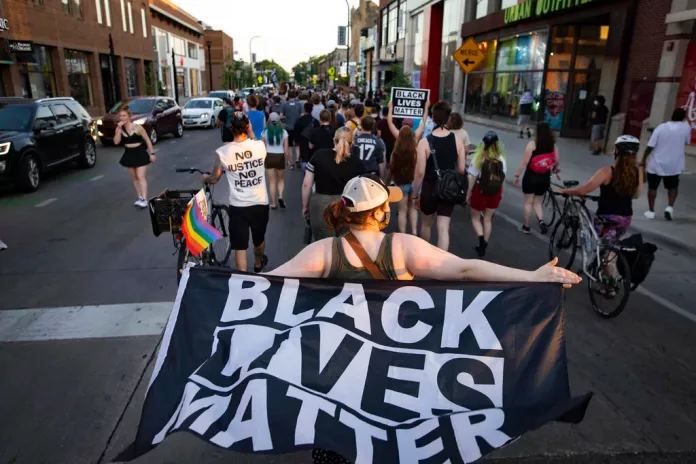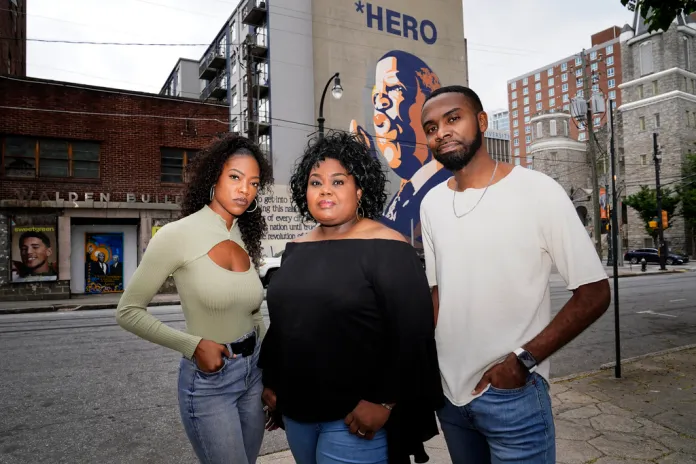In Focus delivers deeper coverage of the political, cultural, and ideological issues shaping America. Published daily by senior writers and experts, these in-depth pieces go beyond the headlines to give readers the full picture. You can find our full list of In Focus pieces here.
One week after national outlets reported that the Justice Department had opened a fraud investigation into the Black Lives Matter Global Network Foundation, the organization announced Friday that it had severed ties with longtime strategist and board member Shalomyah Bowers, citing a “leadership transition.”
The move sharpened scrutiny of the organization’s finances and governance just as federal authorities examine whether tens of millions of dollars raised in 2020 were misused, according to legal experts and nonprofit researchers who have tracked the organization’s scandals.

In a Nov. 7 letter to supporters, BLMGNF said Bowers’s “time on the board has come to an end” and that his consulting firm’s work with the group had ceased. The message framed the shake-up as part of a renewed commitment to “transparency, integrity, and faithful stewardship.”
The announcement followed reports from the Associated Press and CBS News that the Justice Department is investigating whether donations to the national BLM entity were diverted by its leadership after the 2020 racial-justice protests. The investigation, reportedly led out of the U.S. Attorney’s Office in Los Angeles, focuses on possible donor fraud. No charges have been filed, and the foundation says it is not a target of the investigation.
The U.S. Attorney’s Office for the Central District of California declined to comment.
Federal scrutiny comes amid years of controversy surrounding the foundation’s finances. In 2022, Sean Campbell reported in New York Magazine that BLMGNF used nearly $6 million of donated funds to purchase a 6,500-square-foot Los Angeles property through an LLC connected to the law firm Perkins Coie.
The house was initially described as a creative hub, but records showed it had also been used for private events and personal filming projects. Nonprofit group experts said the arrangement blurred boundaries between charitable and private benefit, raising questions about oversight and disclosure.
That same year, the foundation’s first public Form 990 showed it had received roughly $77 million in donations during the height of the 2020 protests and ended the fiscal year with $42 million in assets. The filing also disclosed payments of more than $2.1 million to a consulting firm run by Bowers, nearly $970,000 to a company founded by the father of co-founder Patrisse Cullors’s child, and more than $840,000 to a security firm operated by her brother. Experts said the transactions, while not necessarily illegal, illustrated weak internal controls and potential conflicts of interest for an organization of such size and prominence.
BLMGNF’s governance structure also drew criticism. During the 2020–2021 fiscal year, Cullors served as the foundation’s sole voting board member, and its filings listed only two employees. Nonprofit attorneys called that lack of independent oversight a major red flag for the IRS. Cullors stepped down as executive director in 2021, later admitting she had stayed at the Los Angeles property for several days and hosted two private parties there. She reimbursed the foundation $390 for one event and later conceded that using the house for personal gatherings “probably wasn’t the best idea.”
The separation with Bowers marks another turning point.

His firm’s multimillion-dollar contracts were among the most scrutinized in the foundation’s 990 filings. In 2022, a separate entity known as Black Lives Matter Grassroots sued Bowers and the foundation in Los Angeles County Superior Court, accusing him of diverting about $10 million in donations for personal use and turning the nonprofit into a “personal piggy bank.” Bowers denied any wrongdoing, and in June 2023, a judge dismissed the case under California’s anti-SLAPP statute, finding the plaintiffs lacked standing and failed to substantiate their claims.
Parker Thayer, an investigative researcher at the Capital Research Center, told the Washington Examiner that Bowers’s ouster should be viewed as a warning sign.
“It’s a massive red flag,” he said. “It’s something we haven’t seen at any nonprofit in America in recent history. That’s like a five-alarm fire.”
Thayer added that the Justice Department has been increasingly aggressive in policing nonprofit abuses and said BLMGNF’s issues are so extensive that “there aren’t too many things that a nonprofit could do wrong that BLM hasn’t already done.” He said the group’s repeated controversies around financial disclosures and leadership self-dealing create “a strong likelihood that an investigation will find something that actually goes the distance.”
Thayer also pointed to BLMGNF founder Cullors’s previous admission that she found preparing IRS filings “triggering,” and argued that her reaction betrayed an awareness of deeper problems. “You don’t get scared by paperwork unless it reflects reality,” he said. “I think there is a good chance that something more than clerical errors is found.”
Legal analysts say that any criminal investigation would likely hinge on patterns of wire fraud, tax violations, or false filings with the charity.
John Shu, a constitutional lawyer who served in both Bush administrations, told the Washington Examiner the Justice Department would almost certainly begin by examining “whether they filled out the correct tax forms and whether they lied on them, and what happened to all that money.”
He added that prosecutors would also look at potential conspiracy and fundraising-fraud angles. “Was there a conspiracy among two or more of the leaders to misappropriate funds and to lie on their tax forms?” Shu said. “And did they mislead donors about how their money would be used?”
Shu said the inquiry could also test how far the department is willing to stretch its resources to pursue a case.
“It’s not clear to me that it would stay just in California,” he said. “Because of the scale of the foundation and the national network of donations, this could easily be run out of Main Justice rather than a local U.S. attorney’s office.”
He also suggested the statute-of-limitations clock could still allow prosecutors to act. “People were still donating into 2021, so those transactions are well within the window,” Shu said, noting that a standard five-year federal limit would likely govern potential wire-fraud or tax-related charges. “The first thing they have to do is get a grand jury together, because only the grand jury can issue subpoenas — not only for testimony, but for documents, hard drives, text messages, and emails.”
BLMGNF has insisted it is not a target of the investigation. The group plans to expand its board, tighten conflict-of-interest policies, and conduct an external audit as part of broader transparency reforms. Cullors and other former leaders have described the controversy as exaggerated and politically motivated.
DOJ INVESTIGATING ALLEGATIONS BLACK LIVES MATTER DEFRAUDED DONORS
BLMGNF did not respond to a request for comment from the Washington Examiner.
While it remains unclear whether the Justice Department will ultimately pursue a civil lawsuit or consider criminal charges, the reported investigation into one of the country’s most visible civil-rights organizations has reopened questions about accountability, transparency, and public trust in the movement’s finances, and whether the government will ultimately test those questions in court.
